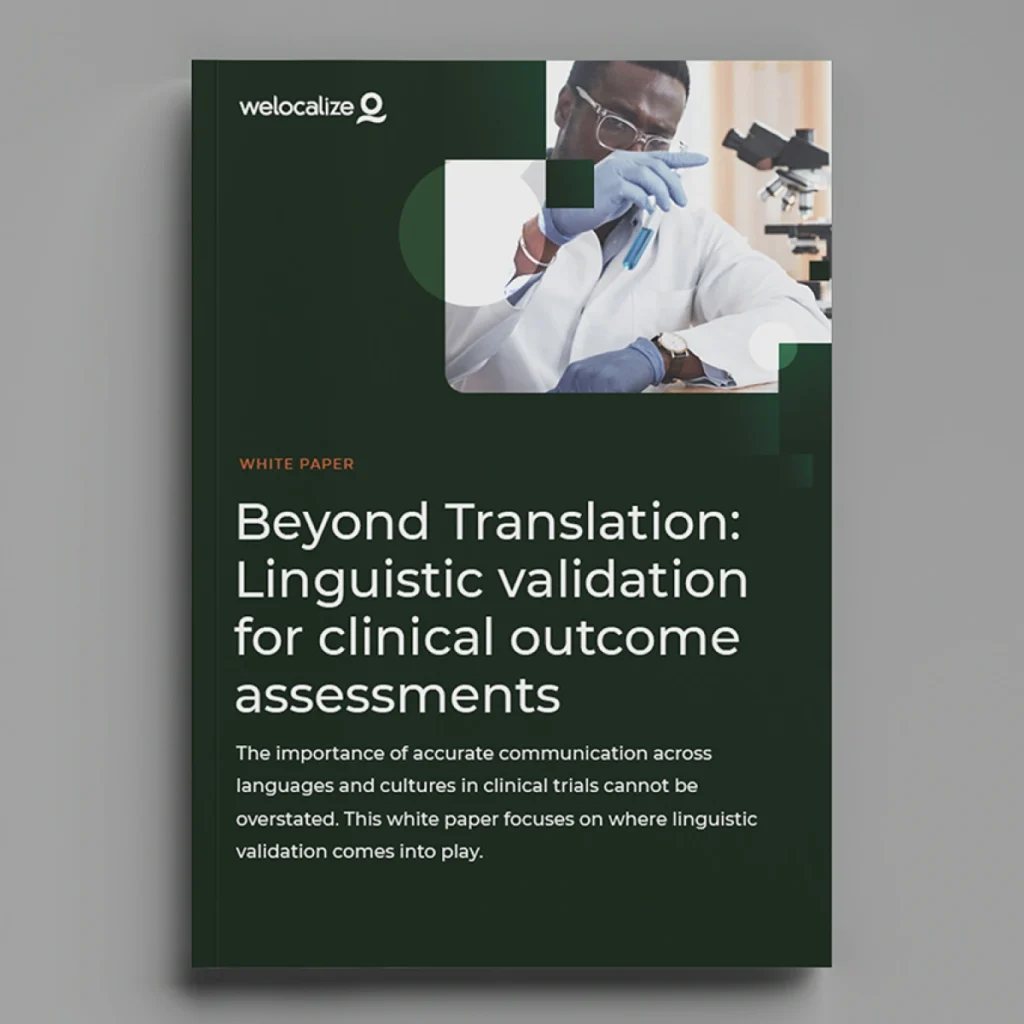Navigating the Complexities of Linguistic Validation for Multinational Clinical Trials
Linguistic validation ensures accurate, culturally appropriate data in multinational clinical trials, meeting global standards and enhancing research outcomes.

As clinical trials expand globally, rigorous linguistic validation has become essential to ensure accurate and reliable data collection. When patient-reported outcomes (PROs) and clinical outcome assessments (COAs) are used in multinational trials, simply translating the materials isn’t enough.
Ensuring these assessments retain their intended meaning across diverse languages and cultures is a complex process that requires a specialized approach.
Here’s a closer look at the challenges of linguistic validation in clinical trials and strategies to overcome them, focusing on maintaining data integrity and meeting regulatory requirements.
What is Linguistic Validation in Clinical Trials?
Linguistic validation goes beyond standard translation. It ensures that patient-facing materials—such as questionnaires to measure treatment outcomes—are conceptually equivalent across different languages.
This process helps guarantee that all participants, regardless of their native language, understand and interpret the questions in the same way. The goal is to produce culturally appropriate translations for accurate data comparison across different regions, ensuring that clinical trial results are reliable and meaningful.

YOU MIGHT LIke…
Linguistic Validation for COAs
Accurate communication across languages in clinical trials cannot be overstated. This white paper focuses on where linguistic validation comes into play.
Key Challenges in Multinational Linguistic Validation
1. Coordinating Translations Across Multiple Countries
Conducting clinical trials in numerous countries involves managing translation efforts on a global scale. This requires aligning translation teams, local experts, and cognitive debriefing participants across various time zones and cultural backgrounds. Effective project management, clear communication channels, and streamlined workflows are critical to ensuring consistent quality and meeting tight regulatory deadlines.
2. Ensuring Measurement Equivalence Across Cultures
Measurement equivalence is a major hurdle in linguistic validation. To ensure accurate data pooling and comparison across regions, the translated assessments must measure the same constructs in the same way as the original. There are three types of equivalence to consider:
- Conceptual Equivalence: Ensure the assessed concepts are perceived similarly across different cultures.
- Item Equivalence: Ensuring individual questions or items carry the same meaning in all languages.
- Operational Equivalence: Verifying that instructions, formats, and assessments are consistent across translations.
Achieving these equivalences is challenging due to cultural variations, idiomatic expressions, and differing health beliefs that can impact how questions are interpreted.
3. Accessing Specialist Clinical Expertise
For successful linguistic validation, clinical experts who understand the language and possess deep knowledge of the medical field relevant to the study are crucial. However, finding qualified experts with the right clinical and linguistic skills—especially for rare diseases or in regions with limited research infrastructure—can be difficult.
Strategies for Overcoming Linguistic Validation Challenges
To tackle these complexities, pharmaceutical companies and contract research organizations should employ a comprehensive approach that integrates linguistic expertise, cultural awareness, clinical knowledge, and strong project management skills.
1. Implement a Comprehensive Linguistic Validation Workflow
Following a structured workflow helps ensure translation accuracy and cultural relevance. The process typically involves:
- Translatability Assessment: Identifying potential linguistic and cultural challenges before translation begins.
- Forward and Back Translation: Utilizing multiple translators to create harmonized translations and verify accuracy.
- Clinician Review: Involving healthcare professionals to ensure the translated content is relevant to the local medical context.
- Cognitive Debriefing: Testing translated materials with native speakers to evaluate clarity and cultural appropriateness.
2. Adopt a Rigorous Process
Adopting a thorough process ensures that the final translations meet high-quality standards and align with regulatory expectations.
3. Choose Between Universal and Country-Specific Translations
Deciding whether to use a universal translation for all regions or create country-specific versions is a strategic choice. Universal translations can be cost-effective, but they may not capture cultural nuances.
In contrast, country-specific adaptations ensure higher cultural accuracy but may increase project costs. A hybrid approach, where a universal translation serves as a base that’s then adjusted for specific regions, can strike a balance between price and quality.
4. Partner with Specialist Linguistic Validation Providers
Engaging a linguistic validation provider with expertise in both language services and life sciences can enhance the quality and efficiency of global clinical trials. These providers have the knowledge and resources to navigate complex regulatory landscapes, such as meeting the U.S. FDA and EMA requirements for PRO measures.
Why is Linguistic Validation Important for Clinical Trials?
Linguistic validation plays a critical role in maintaining the integrity of clinical trial data, especially in multinational studies. Here’s why it matters:
- Ensures Data Integrity Across Regions: Linguistic validation helps eliminate biases that could compromise the accuracy of clinical trial results by accounting for cultural differences and idiomatic expressions.
- Meets Regulatory Expectations: Leading regulatory bodies emphasize the need for linguistic validation to ensure data comparability across different languages. It aligns with the U.S. FDA’s and EMA’s focus on patient-centric measures.
- Improves Patient Compliance and Engagement: When translated materials are clear and culturally appropriate, patients are more likely to understand the assessments, leading to higher compliance and better-quality data.
Ensuring Successful Global Clinical Trials
Linguistic validation is essential for the success of multinational clinical trials, as it ensures that data collected from diverse populations is accurate, reliable, and comparable. Overcoming the challenges of coordinating translations, ensuring measurement equivalence, and accessing specialist expertise requires a rigorous and well-structured approach.
By adopting comprehensive workflows, strategically managing translation efforts, and partnering with experienced providers, companies can enhance the quality of their clinical trials and contribute to meaningful medical research outcomes.
At Welocalize, we specialize in linguistic validation services that go beyond standard translation to ensure cultural and conceptual accuracy in clinical outcome assessments. Contact us to learn how we can support your global clinical research initiatives with expert linguistic validation solutions.
 Siobhan Hanna
Siobhan Hanna Erin Wynn
Erin Wynn
 Nicole Sheehan
Nicole Sheehan Kimberly Olson
Kimberly Olson Matt Grebisz
Matt Grebisz Christy Conrad
Christy Conrad Chris Grebisz
Chris Grebisz Dan O’Brien
Dan O’Brien